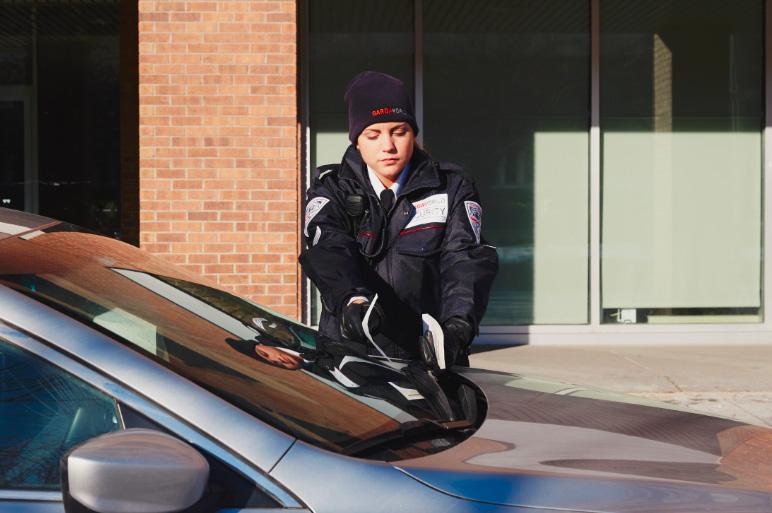
Any organization that wants to ensure its viability and optimize its results must ensure that its resources are used in the best way and place possible. This notion applies to any organization; take hockey, for example. If a coach puts a goalkeeper in the centre and a forward in nets, many of us would be wondering if this would really be the best allocation of resources.
Now let’s consider a dentist's office; if all staff were exclusively dentists, not only would the costs of our visits be astronomical, but many of us would also question whether it would be reasonable have a dentist to perform tasks like paperwork and teeth cleaning.
Yet, when we look at the organization of Canadian police services, we see that many police officers are assigned tasks that could easily be outsourced to qualified security guards; hence why GardaWorld has chosen to actively participate in a movement for the optimization of police services.
The proposal seems to us to be entirely logical: when police officers have to deal with traffic control at an intersection, or give parking tickets, they are not able to track down criminals or intervene in emergency situations. Therefore, let's assign our police officers tasks for which they alone are trained and release them from ancillary tasks by outsourcing them to security guards who are also familiar with high-risk work. At GardaWorld, for example, our guards already carry out tasks requiring a heightened level responsibility, such as transporting cash to financial institutions, transporting detainees for the Canada Border Services Agency, pre-board screening at airports, and ensuring the security of diplomats and embassies.
Essentially, we feel that as a society, we could fight crime more effectively by putting the right people in the right places. By so doing, our police forces will be more focused on conducting investigations, patrolling, fighting terrorism and street gangs, and more.
Many places around the world have adopted this concept of optimizing police services, including the United Kingdom. In Canada, Ontario has shown great leadership, as several municipalities have demonstrated interest, and the Government of Ontario recently tabled Bill 175, which will serve to set parameters.
Examples and an Ipsos Survey
GardaWorld mandated Ipsos Public Affairs to conduct a scientific survey among Canadians on the use of security firms to support police forces.
The survey results show that a clear majority of Canadians would be in favour of security companies supporting our police forces in ancillary tasks. More specifically, nearly twice as many respondents are in agreeance with the concept as opposed to counter it; an excellent starting point for a complex and important issue.
Canadians are in favour of many of the measured proposals identified in the Ipsos survey.
• Security at major events: 79% are in favour versus 16% who are not.
• Traffic management: 70% are in favour versus 24% who are not.
• Enforcing municipal by-laws and issuing parking tickets: 59% are in favour versus 32% who are not.
• Administrative tasks at the police station (forensic identification, administrative support and facility management): 58% are in favour versus 33% who are not.
Canadians also show a significant level of support for other proposals being made by the private security industry, even though there may be a somewhat greater hesitation on their part.
• Assisting victims during the suspect identification process: 49% are in favour versus 42% who are not.
• Taking statements following a theft in the home after the area has been secured by police officers: 45% are in favour versus 46% who are not.
• Detention services and transportation of detainees: 40% are in favour versus 50% who are not.
• Taking statements and fingerprints and transcription of interviews at the police station: 40% are in favour versus 52% who are not.
• Securing crime scenes: 37% are in favour versus 56% who are not.
This latest data is encouraging and suggest that Canadians could potentially lend more support to these proposals. We need to continue to raise awareness and educate people on this initiative, but again, it is a great starting point considering this is an issue that the public knows little about.
Ensuring Viability
In the spring of 2017, the Canadian Chamber of Commerce held a world-class conference on this topic. Our approach is inclusive, and we want to give a voice to as many people as possible in order to ensure a rational social debate.
One of the fundamental reasons why humans form societies is to ensure their safety. With technology, crime evolves and becomes more complex, and the role of police officers becomes increasingly difficult. Demands are increasing while available funding remains limited, even though various levels of government are already devoting colossal amounts of money to public security.
In this regard, a report entitled “The Economics of Canadian Policing: Five Years into the Great Recession” written by Professors Ruddel and Jones, projects a 61% increase in police services costs per resident between 2011 and 2025 in Canada, based on trends observed between 2001 and 2012. Similarly, Mathieu Bédard of the Montreal Economic Institute illustrates in his report that outsourcing support tasks to the private sector could generate substantial savings, in some cases in excess of 50%.
Therefore, given the same budget, it would be possible increase efficiency by allocating the right people in the right places. To reiterate, this is initiative is not about replacing police officers or privatizing police services. Security guards should perform tasks for which they are qualified to support our police officers, and thus enable police officers to devote their time and energy to fighting crime and further serving the public.
The Honourable Christian Paradis
Senior Vice-President
GardaWorld








